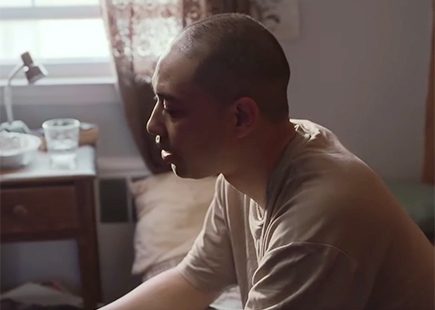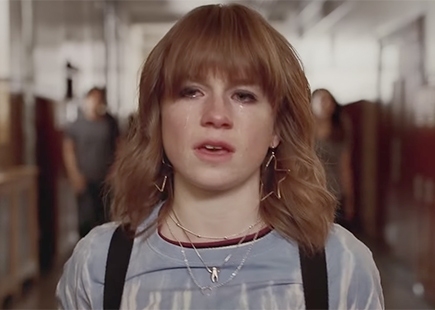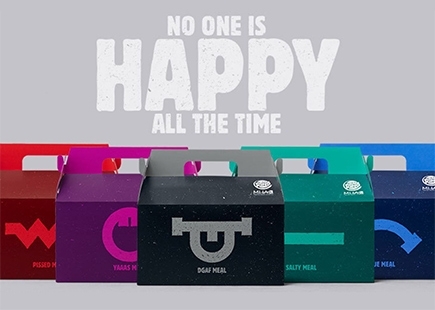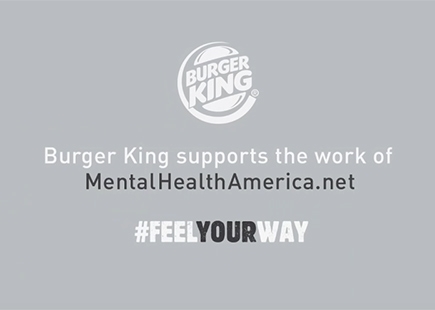In Mental Health Awareness Week Burger King fails to appreciate the reality of suffering from mental illness

The Background
It is hard to know where to start with this.
Less than a decade ago, issues around anxiety, self-esteem, depression and suicide were taboo or simply not taken seriously. Mental health was swept under the carpet, misunderstood, not to be discussed, even mocked and that covered the spectrum from schools to employers, right through to media and policy makers in government.
This is thankfully changing, progress has been made. Recognising the mental health crisis, especially amongst so many young people, brands are getting involved and using their reach and influence to help inform the debate and drive change.
Yet, in the United States, where this campaign has been activated, 24 million Americans with a mental illness are going without treatment. Meanwhile, only 25.1% of youth with severe depression receive some consistent treatment (7-25+ visits in a year). There are a number of factors behind this including insufficient finances or insurance cover to a shortfall in mental health staff and treatment.
Burger King had not previously waded into the arena. It has been brilliantly occupying the role of ‘world’s best challenger brand’ for constantly smart and subversive campaigns against its rival McDonald’s, most notably the now legendary Cannes-winning McWhopper for World Peace Day in 2015. Just this week it launched the brilliant ‘Clown-Free’ birthdays.
Given Burger King’s record in taking on McDonald’s this could be a huge, game-changing opportunity to tackle the issues around mental health. Right?
The Big Idea
Timed to Mental Health Awareness Month in the US, Burger King announced it was launching a range of ‘Real Meals’.
In a pointed reference to ‘Happy Meals’ from McDonald’s, Burger King used the line ‘No one is happy all the time’.
Burger King riffed off its own ‘Have it your way’ motif for a campaign hashtag #feelyourway.
What They Did
Burger King’s “Real Meals” include the Pissed Meal (not a name which translates well to the UK market, but we’ve all had a few late at night), Blue Meal, Salty Meal, Yaaas Meal and DGAF (Don’t Give a F---) Meal, and are available only in select restaurants in five US cities.
The campaign also includes a video spot on YouTube showing a montage of people in various emotional states, using the line: “No one is happy all the time. And that’s OK.”
The company partnered with Mental Health America for the campaign and made a donation to support the charity’s projects.






The Review
It’s good that brands such as Burger King are getting involved. However, from the slick ‘pop’ video, the #feelyourway hashtag, to the dig a McDonald’s, this is a frivolous, shallow and self-satisfied first attempt.
Mental health is not a lifestyle choice, a badge of honour, a bad day or a burger option.
With Real Meals it has been trivialised, branded, watered down and boxed up with purpose, and served with a side of fries.
It’s neither progressive nor provocative, it’s actually shamelessly safe and comfortable. It’s the glossy, arm round the shoulder platitude of ‘We all have bad days and we’ve all got a bit of mental health in us. You’re depressed? Hey, feel your way. We’ve got a burger for that. It’s ok’.
Well, no, it really fucking isn’t.
We want people to start talking about mental health and be heard. Not for someone to open up about depression and for it to prompt in with ‘Yeah, I know, I’ve got a boss that sucks’ or ‘I’m pissed off too!’.
The trouble with getting everyone talking about mental health, especially when brands get involved with what was clearly an idea-first, purpose-second effort, is that the conversation gets reduced to this level of banality.
Awareness raising is the cop-out and refuge of the creative scoundrel.
It’s faux-woke appropriation for cool, relevance and social consciousness that is an empty husk for shameless self-promotion and virtue signalling of the most vapid kind.
Real Meals has zero ambition for meaningful change, steers away from the real issues, the facts, the stats and the uncomfortable truths around the consequences of federal tax cuts and the Republican dismantling of Medicaid.
#Feelyourway because there is no alternative, sunshine.
And it may even win a few Cannes Lions...
In Hindsight
It could be argued now that the purpose of ‘awareness raising’ is over.
What is required now is action to deal with the problem. Anyone can point at a burning building whilst jumping up and down, but what are you going to do to put out the fire?
Even Donald Trump announced in January 2018 that he would take action on mental health. Yet, he constantly stigmatises mental health in order to explain mass school shootings and rebuff all convincing arguments against gun control.
At a time when research-backed psychological interventions have advanced, only a small fraction of people in America who need these services actually receive them. One reason is because they remain unaffordable, especially for those who are in lower socio-economic groups. Meanwhile, Republican attacks on Medicaid and tax cuts have devastated mental health services in many parts of the US due to lack of funds.
For a young American suffering from a mental health issue, but is denied access to treatment, what purpose does #feelyourway serve?
There’s plenty of opportunities and targets for brands such as Burger King to tackle and to drive meaningful change.
The question is do they have the appetite for it?
If you enjoyed this article, you can subscribe for free to our weekly email alert and receive a regular curation of the best creative campaigns by creatives themselves.
Published on:



